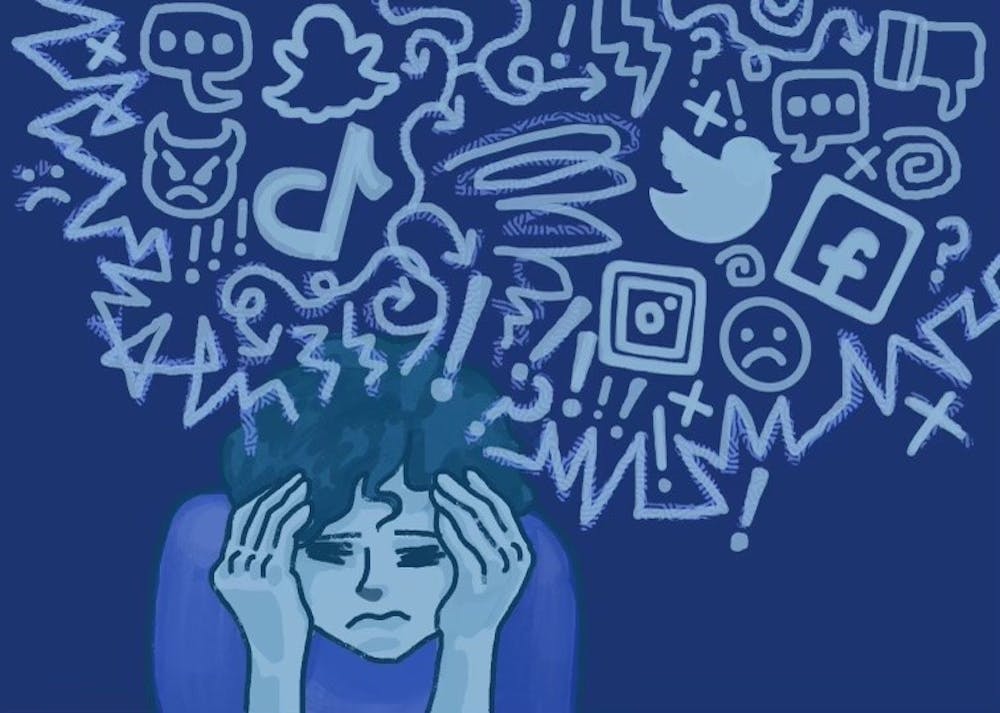Social media portrays a reality that can be false and unattainable. Photos are edited, bodies are altered and blemishes are erased. The photos posted online are as close to perfection as possible. Teens and young adults look up to these posts, comparing themselves to others and feeling anxiety and pressure when there is a lack of similarities in the comparison.
Even ASU is falsely portrayed by social media. The University has a reputation for being a big-time party school. Social media posts from students and the Tempe Barstool account on Instagram help the University keep this reputation. The reality is that these posts are from a fraction of ASU students, therefore not giving the full picture of what the University is actually like.
Social media anxiety is a real thing. It comes about when using social media platforms such as Instagram, Twitter, Facebook and Snapchat. With the pressures and stereotypes that social media demands from its users, it can turn the online world from being exciting to upsetting.
Social media anxiety is something that I, and many other young adults, experience. When I make a post online, many thoughts run through my mind during the rest of the day about how well the post is doing and whether or not I should delete it.
Liesel Sharabi, an assistant professor at Hugh Downs School of Human Communication, discussed the social comparisons social media brings about.
"On social media, we have the tendency to make social comparisons that can make us feel like we're not good enough," Sharabi said. "However, the problem with comparing ourselves to others on social media is that we're seeing people's highlight reels and not the reality of their day-to-day lives."
Sharabi points out both the negative and positive effects of social media on mental health. "On the one hand, it connects us with our friends and provides valuable opportunities for social support. On the other, it can also make us anxious and depressed," Sharabi said.
It is important to know that social media profiles only show a portion of people's lives. And the portion shown is usually the happy, positive and perfect portion, what most people refer to as #goals.
Body image can be affected by making comparisons to others online which can lead to mental health issues and eating disorders. People think that social media shows what your body should and shouldn't look like, which contributes to the body image issues that college students face.
Even without social media, college is a time where body image issues begin and are caused by different factors, such as stress and a lack of access to healthy food. The addition of social media's unrealistic expectations adds fuel to the fire by adding more stress and pressure to college students.
To combat social media anxiety, it is important to find a balance between social media and real life. Samantha Becker is the executive director of Creative + Communications at the University Technology Office. She put an emphasis on having a balance when using social media.
"Balance is important," Becker said. "The anxiety can set in when someone invests too much stock in other people's lives and the version of yourself that you project instead of building deep connections and finding fulfillment in life offline."
College students have to balance academics, extracurriculars and social activities. This balancing act is a challenge, as academics requires a lot of time. Social media portrays that one's time in college should be spent going out every night, meeting new people and having the time of your life. As good as those things are, the reality is that most college students spend most nights staring at their computer screen, in a not Instagram-worthy outfit, working on school assignments.
It is important to not invest too much time online. Social media projects a false narrative of reality which can be damaging for its users. Knowing and understanding the purpose of social media, which is to stay connected with the ones you love most, can lessen the anxiety surrounding its use.
Social media should be used for pleasure and to make and keep connections. With social media anxiety, it is difficult to find how to have fun with social media. Being true to yourself is the first step in erasing social media anxiety and building a positive relationship with social media.
Editor's note: The opinions presented in this column are the author's and do not imply any endorsement from The State Press or its editors.
Reach the columnist at amsolom2@asu.edu and follow @_alexmarie on Twitter.
Like The State Press on Facebook and follow @statepress on Twitter.
Want to join the conversation? Send an email to opiniondesk.statepress@gmail.com. Keep letters under 500 words and be sure to include your university affiliation. Anonymity will not be granted.
Continue supporting student journalism and donate to The State Press today.




